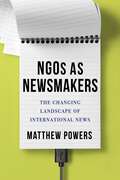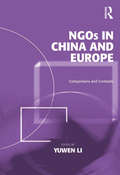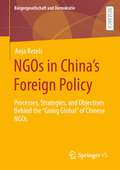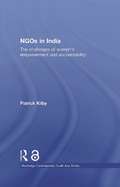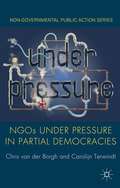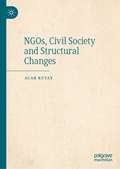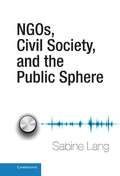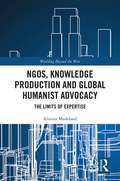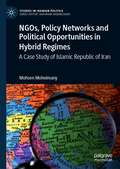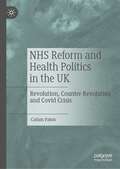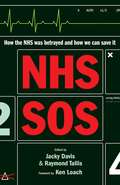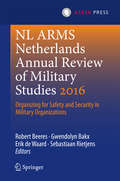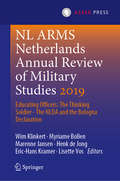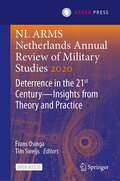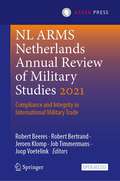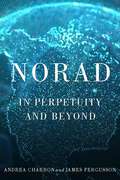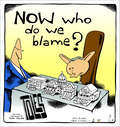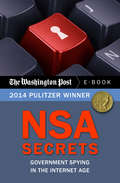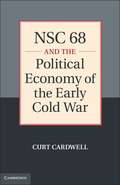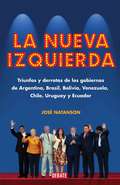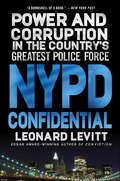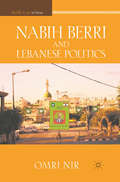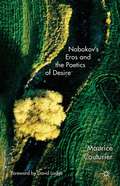- Table View
- List View
NGOs as Newsmakers: The Changing Landscape of International News (Reuters Institute Global Journalism Series)
by Matthew PowersAs traditional news outlets’ international coverage has waned, several prominent nongovernmental organizations have taken on a growing number of seemingly journalistic functions. Groups such as Amnesty International, Human Rights Watch, and Médecins Sans Frontières send reporters to gather information and provide analysis and assign photographers and videographers to boost the visibility of their work. Digital technologies and social media have increased the potential for NGOs to communicate directly with the public, bypassing traditional gatekeepers. But have these efforts changed and expanded traditional news practices and coverage—and are there consequences to blurring the lines between reporting and advocacy?In NGOs as Newsmakers, Matthew Powers analyzes the growing role NGOs play in shaping—and sometimes directly producing—international news. Drawing on interviews, observations, and content analysis, he charts the dramatic growth in NGO news-making efforts, examines whether these efforts increase the organizations' chances of garnering news coverage, and analyzes the effects of digital technologies on publicity strategies. Although the contemporary media environment offers NGOs greater opportunities to shape the news, Powers finds, it also subjects them to news-media norms. While advocacy groups can and do provide coverage of otherwise ignored places and topics, they are still dependent on traditional media and political elites and influenced by the expectations of donors, officials, journalists, and NGOs themselves. Through an unprecedented glimpse into NGOs’ newsmaking efforts, Powers portrays the possibilities and limits of NGOs as newsmakers amid the transformations of international news, with important implications for the intersections of journalism and advocacy.
NGOs in China and Europe: Comparisons and Contrasts
by Yuwen LiThis volume presents a comparison of the experiences of NGOs in China and Europe. The chapters on China contain the most comprehensive and up-to-date analysis of various types of NGOs currently active in the country. The contributions on foreign NGOs in China, non-governmental think tanks, public interest legal organizations, labour related NGOs and charity organizations, are the first in English to discuss successful experiences as well as the difficulties they face in the post-Mao era. The European studies draw examples from countries where the experiences of NGOs are at various stages of development. The section on NGOs in Central and Eastern Europe examines the rapid expansion of civil society and their pivotal role in promoting political change and building democracy in a transitional society, as well as the challenges they confront in advancing a strong civil society. Those chapters on NGOs' experiences in Western European countries, especially in the Netherlands and the UK, provide insightful information and examination of the most contentious issues concerning NGOs' accountability, governance and relationship with the government.
NGOs in China’s Foreign Policy: Processes, Strategies, and Objectives Behind the “Going Global” of Chinese NGOs (Bürgergesellschaft und Demokratie)
by Anja KetelsIn recent years, China has not only expanded its economic presence worldwide but has also actively pursued initiatives to enhance its global leadership, promote international cooperation, and provide humanitarian aid. Concurrently, Chinese NGOs have played an increasingly active role in China's international diplomacy, initiating projects overseas and establishing offices in Belt and Road Initiative countries. This book delves into this trend by examining China's global strategy, the role of NGOs, and exploring the perspectives of these organizations themselves on their functions and roles in international politics. It presents a typology of NGOs within China's foreign policy, summarizing the diverse factors that influence their multifaceted involvement. The book reveals the divergence between Chinese and Western understandings of global governance and highlights the significance of the international engagement of Chinese NGOs as a new and noteworthy phenomenon in the fields of international relations and global governance.
NGOs in India: The challenges of women's empowerment and accountability (Routledge Contemporary South Asia Series)
by Patrick KilbyA PDF version of this book is available for free in open access via www.tandfebooks.com as well as the OAPEN Library platform, www.oapen.org. It has been made available under a Creative Commons Attribution-Non Commercial-No Derivatives 3.0 license and is part of the OAPEN-UK research project. By examining how NGOs operate in Southern India in the early 2000’s, this book discusses the challenges faced by small, local NGOs in the uncertain times of changing aid dynamics. The key findings focus on what empowerment means for Indian women, and how NGO accountability to these groups is an important part of the empowerment being realised. The notion of community empowerment, in which the ‘solidarity’ of a group can be a path to individual empowerment, is discussed, as well as analysing how empowerment can be a useful concept in development. Based on case studies of 15 NGOs as well as in-depth interviews with 80 women’s self-help groups, the book highlights the key features of effective empowerment programs. The author uses innovative statistical analysis tools to show how a key factor in empowerment of marginalised women is the accountability relationship between themselves and the supporting NGO. The book goes on to discuss the ways that NGOs can work with communities in the future, and recognises the limitations of a donor-centric accountability framework. It provides a useful contribution to studies on South Asia as well as Gender and Development Studies.
NGOs under Pressure in Partial Democracies
by Chris van der Borgh Carolijn TerwindtOver the past decade, international human rights organizations and think tanks have expressed a growing concern that the space of civil society organizations around the world is under pressure. This book examines the pressures experienced by NGOs in four partial democracies: Guatemala, Honduras, Indonesia and the Philippines. Based on fieldwork, it analyzes the complex processes of shrinking political space and the ways NGOs and grassroots organizations try to defend and reclaim their space.
NGOs, Civil Society and Structural Changes
by Acar KutayThis book suggests that our notions of civil society have undergone radical changes—including structural changes in the nature of Civil Society Organizations (CSOs) and Non-Governmental Organizations (NGOs). Such massive structural changes greatly problematize the older liberal view of a simple split between state and civil society actors which nonetheless remains dominant in much of social and political sciences. The author argues that the naturalist and behaviorist approaches to civil society occlude the fact that citizens increasingly live within a particular and highly contestable way of imagining and constructing civil society. The book shows that changes in how civil society is conceptualized and organized around new practices, might mark radically new conceptions of the state that are ideologically neo-liberal and subtle in the ways they disempower ordinary citizens.
NGOs, Civil Society, and the Public Sphere
by Sabine LangNongovernmental organizations act on behalf of citizens in politics and society. Yet many question their legitimacy and ask who they speak for. This book investigates how NGOs can become stronger advocates for citizens and better representatives of their interests. Sabine Lang analyzes the choices that NGOs face in their work for policy change between working in institutional settings and practising public advocacy that incorporates constituents' voices. Whereas most books on NGOs focus on policy effectiveness, using approaches that treat accountability largely as a matter of internal performance measurements, Lang instead argues that it is ultimately several public accountabilities that inform NGO legitimacy. The case studies in this book use empirical research from the European Union, the United States and Germany to point to governments' role in redefining the conditions for NGOs' public advocacy.
NGOs, Knowledge Production and Global Humanist Advocacy: The Limits of Expertise (Worlding Beyond the West)
by Alistair MarklandNGOs, Knowledge Production and Global Humanist Advocacy is an empirically and theoretically rich account of how international non-governmental organisations produce knowledge of and formulate understandings about the world around them. The author applies critical and sociological perspectives to analyse the social and political limits of knowledge generated in support of global advocacy efforts aimed at enhancing human rights and preventing violent conflicts. It is found that, despite their transnational networks and claims to humanist universality, the proximity of global advocates to Western power structures and elite social spaces delimits their worldviews and curtails the potential for radical departures from mainstream political thinking.This book will be of interest to scholars and students of international relations, human rights, the sociology of knowledge, peace and conflict studies, and critical security studies.
NGOs, Policy Networks and Political Opportunities in Hybrid Regimes: A Case Study of Islamic Republic of Iran (Studies in Iranian Politics)
by Mohsen MoheimanyThis book discusses the diversity and resilience in a hybrid regime where civil society organisations are either provided with complex sets of opportunities or face severe constraints. By studying the case of Iran between 1997 and 2013, it shows how the Islamic Republic regime went into two opposite directions under two presidencies and played in-between supporting and suppressing advocacy NGOs. After accommodating a novel theoretical framework enabling scholars to identify the contributing factors of diversity in the regime, four case-study chapters are designated for comparing the women’s rights and environmental NGOs across local and national governments. These two political and technical policy areas demonstrate the different scopes of freedoms for advocacy NGOs. The contrasting narratives of the civil activists and policymakers imply paradoxes and shifts in the arrangement of opportunities for action and advocacy, although the leadership and structure of the regime remained unchanged during the period of study.
NGOs, Political Protest, and Civil Society
by Carew BouldingThis book argues that non-governmental organizations (NGOs) have an important effect on political participation in the developing world. Contrary to popular belief, they promote moderate political participation through formal mechanisms such as voting only in democracies where institutions are working well. This is a radical departure from the bulk of the literature on civil society that sees NGOs and other associations as playing a role in strengthening democracy wherever they operate. Instead, Carew Boulding shows that where democratic institutions are weak, NGOs encourage much more contentious political participation, including demonstrations, riots, and protests. Except in extreme cases of poorly functioning democratic institutions, however, the political protest that results from NGO activity is not generally anti-system or incompatible with democracy again, as long as democracy is functioning above a minimal level. "
NHS Reform and Health Politics in the UK: Revolution, Counter-Revolution and Covid Crisis
by Calum PatonThis book provides an original analysis of the trajectory of health policy reform in the United Kingdom from the beginning of the ‘Thatcher reforms’ in the 1980s right up to the latest changes in England in 2022. Rooted in political science and health policy analysis, it tackles key arguments around the ‘new integration’ of the NHS since 2015, what the new and emerging NHS structure represents, the UK’s poor response to the Covid-19 crisis, and the future threat to a comprehensive public NHS. It includes significant new material on what has happened since 2015, such as the politics of the Covid-19 pandemic, the effects of Brexit, and the conundrum of ‘social care’. The book is a scholarly and polemical analysis from an expert who has studied the politics of health services for more than forty years. It will be a key resource for students, academics and policy makers.
NHS SOS: How the NHS Was Betrayed - and How We Can Save It
by Raymond Tallis Jacky DavisThe Coalition Government passed into law an unprecedented assault on the NHS. Doctors, unions, the media, even politicians who claimed to be stalwart defenders failed to protect it. Now the effect of those devastating reforms are beginning to be felt by patients - but we can still save our country's most valued institution if we take lessons from this terrible betrayal and act on them.
NL ARMS Netherlands Annual Review of Military Studies 2016
by Robert Beeres Gwendolyn Bakx Erik De Waard Sebastiaan RietjensNL ARMS 2016 offers a collection of studies on the interrelatedness of safety and security in military organizations so as to anticipate or even prepare for dire situations. The volume contains a wide spectrum of contributions on organizing for safety and security in a military context that are theoretically as well as empirically relevant. Theoretically, the contributions draw upon international security studies, safety science and organizational studies. Empirically, case studies address the reality of safety and security in national crisis management, logistics and unconventional warfare, focusing, amongst others, on rule of law during missions in which expeditionary military forces are involved in policing tasks to restore and reinforce safety and security and on the impact of rule of law on societal security. The result is a truly unique volume that may serve practitioners, policymakers and academics in gaining a better understanding of organizing for the security-safety nexus.
NL ARMS Netherlands Annual Review of Military Studies 2019: Educating Officers: The Thinking Soldier - The NLDA and the Bologna Declaration (NL ARMS)
by Wim Klinkert Myriame Bollen Marenne Jansen Henk De Jong Eric-Hans Kramer Lisette VosThis book has as its subject matter the academic education of officers and builds on the signing of the Bologna Declaration in 1999 by twenty-nine European ministers for Education and Science, who thereby agreed to coordinate higher education across Europe, by, for instance, the implementation of the Bachelor's and Master's system. In the meantime, military academies have also introduced the BaMa system into their programs for officers’ education, which marks a transition from the old days, when officers’ education took place within a national military system, under military command, and was firmly grounded in principles, traditions and needs, as professed by the Ministries of Defence and the armed forces in particular. So the Bologna Declaration can be seen as crucial leverage for the development of in-house academic degree programs as a fundamental part of officers’ education. With this volume, the editors of NL ARMS 2019 strive to offer a platform to both academics and military and civilian practitioners, as well as to combinations of these, to reflect and share their thoughts on officers’ education `before and after' Bologna, both in The Netherlands and abroad. To this end, controversies and challenges, affecting various aspects and systems of officers’ education, have been grouped into five themes. Respectively, the first four themes comprise institutional settings and change; educational philosophy; educational challenges and reflective practices; and didactical solutions. The fifth theme, international perspectives, provides insights into the strategic environments and challenges faced by sister-academies, as well as ways to further officers' education across Europe, such as offered by Erasmus programs. All the editors of this year's volume are affiliated with the Faculty of Military Sciences of the Netherlands Defence Academy in Breda, The Netherlands.
NL ARMS Netherlands Annual Review of Military Studies 2020: Deterrence in the 21st Century—Insights from Theory and Practice (NL ARMS)
by Frans Osinga Tim SweijsThis open access volume surveys the state of the field to examine whether a fifth wave of deterrence theory is emerging. Bringing together insights from world-leading experts from three continents, the volume identifies the most pressing strategic challenges, frames theoretical concepts, and describes new strategies.The use and utility of deterrence in today’s strategic environment is a topic of paramount concern to scholars, strategists and policymakers. Ours is a period of considerable strategic turbulence, which in recent years has featured a renewed emphasis on nuclear weapons used in defence postures across different theatres; a dramatic growth in the scale of military cyber capabilities and the frequency with which these are used; and rapid technological progress including the proliferation of long-range strike and unmanned systems. These military-strategic developments occur in a polarized international system, where cooperation between leading powers on arms control regimes is breaking down, states widely make use of hybrid conflict strategies, and the number of internationalized intrastate proxy conflicts has quintupled over the past two decades. Contemporary conflict actors exploit a wider gamut of coercive instruments, which they apply across a wider range of domains. The prevalence of multi-domain coercion across but also beyond traditional dimensions of armed conflict raises an important question: what does effective deterrence look like in the 21st century? Answering that question requires a re-appraisal of key theoretical concepts and dominant strategies of Western and non-Western actors in order to assess how they hold up in today’s world.Air Commodore Professor Dr. Frans Osinga is the Chair of the War Studies Department of the Netherlands Defence Academy and the Special Chair in War Studies at the University Leiden. Dr. Tim Sweijs is the Director of Research at The Hague Centre for Strategic Studies and a Research Fellow at the Faculty of Military Sciences of the Netherlands Defence Academy in Breda.
NL ARMS Netherlands Annual Review of Military Studies 2021: Compliance and Integrity in International Military Trade (NL ARMS)
by Joop Voetelink Robert Beeres Job Timmermans Robert Bertrand Jeroen KlompThis is open access volume of the NL ARMS offers an interdisciplinary view on the domain of Compliance and Integrity in International Military Trade (CIIMT), integrating defence economics, international law, arms export control frameworks and policies, information management, organizational sciences and ethics. Although, in academia, and from an interdisciplinary perspective, CIIMT constitutes a relatively novel research domain, across private and public defence-related sectors, the subject evokes high levels of attention and interest, instigating a need for critical thinking, reflection and creativity to address ensuing multi-faceted issues and problems. The Faculty of Military Sciences at the Netherlands Defence Academy extends an in-house MSc programme on CIIMT, which, by integrating practice-based and scientific-based knowledge, aims to contribute to this need. The MSc programme on CIIMT is concerned with exploring, analysing, understanding, explaining, controlling and improving the military dimension in international military trade. More particularly, CIIMT studies managerial questions regarding strategic trade control of military and dual-use goods and services.CIIMT ties in with the Netherlands Defence Academy’s vision on scientific education, embedded in the reflective practitioners' paradigm uniting both management and leadership skills needed to decide and operate in high-tension and high-risk knowledge intensive environments. The Faculty of Military Sciences uses the reflective practitioners’ paradigm to refer to critical thinking, reflection and Bildung that characterize its thinking doers, the so-called Thinking Soldiers, either at the academic Bachelor’s or Master’s level. In view of the complexity of the international trade regarding military and dual-use goods and services, the rapid evolvement of strategic trade control and frameworks, and its importance to procurement processes, defence organizations require innovative thinking doers, who, based on an in-depth understanding, from an interdisciplinary perspective can be expected to find - and take responsibility for - creative solutions to problems.NL ARMS 2021 comprises, amongst others, contributions from students and lecturers partaking in this programme. All the editors are affiliated with the Faculty of Military Sciences of the Netherlands Defence Academy in Breda, The Netherlands.
NORAD: In Perpetuity and Beyond (McGill-Queen's/Brian Mulroney Institute of Government Studies in Leadership, Public Policy, and Governance)
by James Fergusson Andrea CharronThe North American Aerospace Defense Command (NORAD) has undergone wide-ranging changes since 2006, when it was given a new maritime warning mission and the NORAD Agreement was signed in perpetuity. Andrea Charron and James Fergusson trace NORAD’s recent history, marked by innovations in technology and in command and control, but also by unprecedented threats. The shared defence of North America remains an important issue that should extend to other areas, such as the joint defence of the maritime and cyber domains. Fuelled by a deep curiosity about the command and its decisions made in the face of inevitable geopolitical and technological changes, this book uses a functional lens to evaluate NORAD’s options and the technological and organizational solutions needed to defend North America. The authors investigate the ways in which the NORAD command might adapt in the future as it struggles to modernize and keep ahead of new threats.This book comes at a critical time. The rise of new peer competitors requires a fundamental reconsideration of North American defence. As one of very few contemporary analyses of the command and its future, NORAD will be a vital tool for scholars and practitioners.
NOW Who Do We Blame?: Political Cartoons by Tom Toles
by Tom Toles"My cartoons are my best appraisal of a situation presented in the funniest or most compelling way I can. Read my cartoons. What I have to say is in them."—Tom TolesIt's been a decade since political cartoonist Tom Toles collected his panels in book form. He's had a busy decade and plenty of time to further sharpen both his wit, commentary, and pen. NOW Who Do We Blame? presents an editorial master at the top of his game, in all of his whimsical, sometimes scathing, and always insightful glory.Toles, editorial cartoonist for the Washington Post, includes his favorite frames from the past. His subjects include the 9/11 Commission, the 2004 presidential election, terrorism, the Middle East conflict, Yasser Arafat, Afghanistan, Iraq, and of course George W. Bush. The collection title, in fact, comes from a panel showing Bush at his desk, covered with miniatures of the GOP White House, GOP Senate, GOP House, and GOP Supreme Court. "Now who do we blame?" asks the puzzled Commander in Chief.Such is the humor, satire, and intelligence of one of the most accomplished and widely read political cartoonists working today. Toles, who draws himself as the artist working in the lower right corner of his panels, takes on every issue and every powerbroker that crosses the national screen.
NSA Secrets: Government Spying in the Internet Age
by The Washington PostThe Pulitzer Prize–winning investigation into surveillance abuses and the Edward Snowden case that brought them to light. The NSA's extensive surveillance program has led Americans to question threats to their privacy. As reported by the Washington Post, in their Pulitzer Prize-winning coverage of whistleblower Edward Snowden's NSA leaks, NSA Secrets delves into the shadowy world of information gathering, exposing how data about you is being collected every day. From his earliest encrypted exchanges with reporters, Edward Snowden knew he was a man in danger. Sitting on a mountain of incriminating evidence about the NSA surveillance programs, Snowden was prepared to risk his freedom, and his very life, to let the world know about the perceived overreach of the NSA and the massive collection of personal information that was carried out in the name of national security by the U.S. government. The Washington Post&’s complete coverage of the NSA spying scandal, which it helped break, is now collected in one place to give as comprehensive a view of the story as is known. From the first contact with Snowden to the latest revelations in worldwide cellphone tracking, the award-winning reporters at the Post have vigorously reported on the scope of the NSA&’s surveillance. Snowden called the internet &“a TV that watches you,&” and accused the government of &“abusing [it] in secret to extend their powers beyond what is necessary and appropriate.&” Here, the secrets of those who tried in vain to remain in the shadows are revealed.
NSC 68 and the Political Economy of the Early Cold War
by Curt CardwellNSC 68 and the Political Economy of the Early Cold War re-examines the origins and implementation of NSC 68, the massive rearmament program that the United States embarked upon beginning in the summer of 1950. Curt Cardwell reinterprets the origins of NSC 68 to demonstrate that the aim of the program was less about containing communism than ensuring the survival of the nascent postwar global economy, upon which rested postwar U.S. prosperity. The book challenges most studies on NSC 68 as a document of geostrategy and argues instead that it is more correctly understood as a document rooted in concerns for the U.S. domestic political economy.
NUEVA IZQUIERDA, LA (EBOOK)
by Jose NatansonEl ascenso de la izquierda es la principal noticia política de Sudamérica. En pocos años, casi todos los países de la región eligieron a líderes que proponen un camino distinto: Hugo Chávez en Venezuela, Evo Morales en Bolivia, los Kirchner en la Argentina, Lula en Brasil, Tabaré Vázquez en Uruguay, Rafael Correa en Ecuador, y Ricardo Lagos y Michelle Bachelet en Chile. La nueva izquierda analiza los procesos que llevaron al gobierno a personas que antes nunca hubieran soñado con alcanzarlo: desde un militar de pasado golpista y un ex obrero metalúrgico, hasta un indígena cocalero y un matrimonio político que prometía recuperar los valores del viejo peronismo. Sin ahorrar críticas pero reconociendo los aspectos positivos, el libro aborda los principales problemas de la izquierda en el poder: las limitaciones para desarrollar políticas económicas audaces, los obstáculos para consolidar la integración regional y el pantanoso debate institucional sobre el populismo. Y, finalmente, la vara con la que se debería medir el éxito o el fracaso de estos nuevos gobiernos: la lucha contra la pobreza y la desigualdad. Mezcla de ensayo político, crónica periodística y relato de viaje, La nueva izquierda incluye desde estadísticas económicas e interpretaciones históricas hasta letras de canciones populares. Para escribir este libro, José Natanson realizó una larga investigación que incluyó una veintena de viajes por la región; se metió en mercados pobrísimos y despachos alfombrados, asistió a acalorados actos de campaña y a reposados seminarios académicos. En el camino, entrevistó a los referentes más importantes de la política y el pensamiento de Sudamérica: de Néstor Kirchner y Ricardo Lagos a Fernando Henrique Cardoso y Eduardo Duhalde; de Teodoro Petkoff y Guillermo O Donnell a Ernesto Laclau y Bernardo Kliskberg. Flexible y pragmática, la izquierda en el poder es muy diferente de las viejas vanguardias revolucionarias. Una izquierda realmente nueva, pero que se puede seguir llamando izquierda. Es, en definitiva, la protagonista de un inesperado cambio de época. Este libro es una radiografía apasionante de este nuevo tiempo político.
NYPD Confidential: Power and Corruption in the Country's Greatest Police Force
by Leonard LevittFor years, the police commissioner and the mayor of New York City have duked it out for publicity, credit, and power. Some have translated their stardom into success after leaving office, while others have been hung out to dry. In the battle for control of the country's most powerful police force, these high-status government officials have often chosen political expediency over public honesty. The result is a legacy of systemic corruption and cover-ups that is nothing less than shocking. Respected journalist Leonard Levitt has covered the NYPD for New York Newsday, and the New York Post among other papers. His columns have made him persona non grata in police headquarters. In NYPD Confidential, he reveals everything he's discovered throughout his decades-long career. With amazing details of backroom deals and larger-than-life powerbrokers, Levitt lays bare the backstabbing, power-grabs, and chaotic internal investigations that have run the NYPD's reputation into the ground in the past—and the forces conspiring to do so once again.
Na sombra
by Príncipe Harry Duque de SussexFilho e neto de duas das mulheres mais fotografadas do século XX e membro da família mais famosa do mundo, o Príncipe Harry conta, pela primeira vez, a sua história. Uma partilha intensa e emocionante que nos revela o homem além do Príncipe. Foi uma das imagens mais duras do século XX: dois jovens rapazes, dois príncipes, caminhando atrás do caixão da mãe, cena a que o mundo assistia em absoluta comoção - e horror. No momento em que Diana, princesa de Gales, era entregue à sua morada final, milhares de milhões de pessoas perguntavam-se o que estariam os príncipes a pensar e a sentir - e o que seria feito deles desse dia em diante. É aqui que Harry conta, finalmente, essa história. Antes de perder a mãe, aos 12 anos, o príncipe Harry era feliz e despreocupado - em contraste com a seriedade do irmão mais velho, herdeiro da Coroa. A dor daquela perda mudou tudo. Começou a ter dificuldades na escola, deixou-se dominar pela raiva e pela solidão e, por ver a imprensa como a responsável pela morte da mãe, rejeitava a ideia de viver sob os holofotes. Aos 21 anos, juntou-se ao Exército britânico. A disciplina deu-lhe estrutura, e duas missões militares fizeram dele um herói no seu país. Mas depressa se sentiu mais perdido que nunca: sofria de stress pós-traumático e tinha ataques de pânico paralisantes. Acima de tudo, não conseguia encontrar o amor verdadeiro. Até que conheceu Meghan. O mundo rendeu-se ao romance digno de cinema e exultou com o seu casamento de conto de fadas. Porém, desde o início, Harry e Meghan foram perseguidos pela imprensa e submetidos a ondas de violência, racismo e mentiras. Perante o sofrimento da mulher, considerando que a segurança e a saúde mental de ambos estava em risco, Harry não viu outra alternativa senão abandonar a sua pátria para evitar uma trágica repetição do passado. Ao longo dos séculos, deixara família real foi algo a que poucos se atreveram. Na verdade, a última pessoa a tentá-lo tinha sido a sua mãe… Pela primeira vez, o príncipe Harry conta a sua história, narrando a sua viagem com uma honestidade crua e inabalável. Um livro histórico, pleno de visão, descobertas, introspeção e experiência, Na Sombra revela como o amor triunfa sempre sobre a dor.
Nabih Berri and Lebanese Politics
by Omri NirNabih Barri is a key figure in the Lebanese and Shi'ite politics for the last three decades. As the leader of the Shi'ite Amal movement since 1980 and as the Lebanese Speaker since 1992, Barri played a major role in all political events and processes in Lebanon between the early 1980's and today, including the current severe Lebanese crisis.
Nabokov’s Eros and the Poetics of Desire
by Maurice CouturierNabokov gained international fame with Lolita, a highly erotic and morally disturbing novel. Through its comprehensive study of the amorous and sexual behaviors of Nabokov's characters this book shows how Eros, both as a clown or a pervert, contributes to the poetic excellence of his novels and accounts for the unfolding of the plots.
